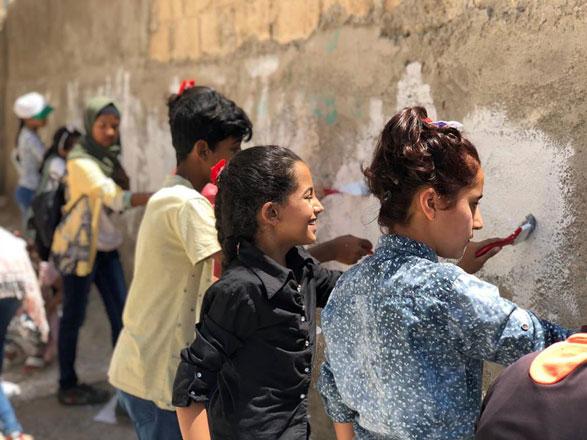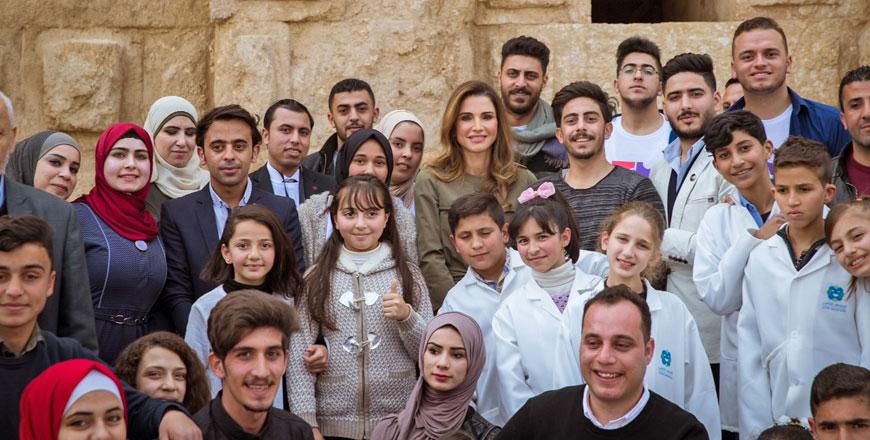You are here
800 children resume learning through creative activities
By Camille Dupire - Aug 07,2018 - Last updated at Aug 07,2018

Children involved in the Together We Learn project take part in creative activities recently (Photo courtesy of ILearn)
AMMAN — Driven by the belief that the root cause of children and youth vulnerability stems from a “discouraging educational system” and a lack of young role models, social entrepreneur Saddam Sayyaleh launched “Together We Learn”, a project aimed at providing underprivileged youngster with the opportunity to enhance their life skills through creative activities.
“Children have few safe outlets for social or recreational activities, and limited means to express themselves,” stated Sayyaleh, founder of Jerash-based ILearn, an educational NGO that works to establish safe spaces for disadvantaged children and youth to encourage innovation, intellectual growth, and critical thinking.
“Because they are not adequately engaged in positively shaping the environment around them, children have few chances to further develop their leadership skills and enhance their critical thinking skills. This has stifled their ability to think critically, solve problems and engage in meaningful dialogue,” he told The Jordan Times on Tuesday, stressing “yet, these are much needed skills recognised as the cornerstone of a productive and forward thinking society.”
With the support of Swiss-based foundation Drosos and in partnership with Edvise ME, ILearn reached out to over 800 vulnerable children aged between 10 and 14 years across the Kingdom.
Assisted by some 250 volunteers and 100 teachers operating in Jerash, Zarqa, East Amman and Baqa’a, the children have been receiving interactive, creative trainings in four main topics: arts, life skills, languages and programming and app development.
Eleven-year-old Ola, who took part in the initiative, told The Jordan Times “I like using the computer here as I don’t have a computer at home. I learned how to code a video game, it’s fun!”
Meanwhile, Syrian participant Ali, 13, rejoiced: “I made new friends at the space and I like the arts class. We made a butterfly from fluid colours, I really liked it.”
“Despite many initiatives’ efforts to create new opportunities to integrate children in education, a key failure we observed was that these attempts did not include the children’s engagement in their communities to foster a sense of community bonds,” Sayyaleh remarked, stressing that this has been further aggravated by the lack of parents’ advocacy for their children’s rights and a great lack of youth mentors.
Using role playing, painting and storytelling, among many other activities, the project encourages children to become more proactive and develop positive prospects for the future, the young entrepreneur explained, noting that the learning methods were specifically adapted to the children’s needs, abilities and challenges.
Asma, a 23-year-old youth volunteer with ILearn said: “I feel like I am doing something productive and useful with my time. I have seen children coming to ILearn space in Jerash for three years but this is my first time volunteering with them.”
“It is very nice to know that children are waiting for us before we arrive. I am learning a lot from teaching children, things I did not know I could do,” she told The Jordan Times.
To ensure the community’s appropriation of the project and a sustainable impact, Together We Learn is involving a number of Community Based Organisations (CBOs), NGOs and local initiatives.
“I Learn’s experience working hand in hand with the community, building rapport with CBO’s, interacting with youth volunteers has already established the relevance of this model,” Sayyaleh underscored, citing how the community “already felt our initial impact on the ground and witnessed our successes”.
“Ultimately, we seek to provide learning opportunities for vulnerable children by formalising our practices in a curriculum that facilitators will be able to use to engage with children,” the NGO founder continued, noting that, once the project concludes in September 2019, interactive teaching aids will be developed and training provided to teachers and volunteers across the Kingdom, with the aim of promoting continued implementation of the initiative in state schools and social organisations.
Related Articles
AMMAN — Her Majesty Queen Rania on Tuesday visited the non-profit initiative, "I Learn Jo: Space for Knowledge" at the Jerash Visitor’s Cent
AMMAN — Jerash-born Saddam Sayyaleh could have easily fallen off the grid after the orphan dropped out of school when he was a teenager.&nbs
AMMAN — Since the suspension of schools in mid-March at the beginning of the lockdown in Jordan, the government turned towards remote educat













